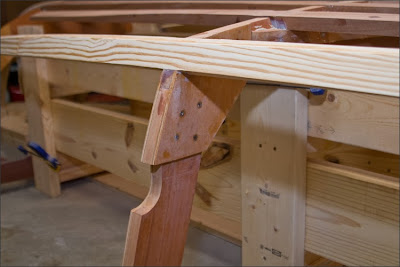A fellow boatbuilder pointed out to me that if I cover the transom first, before planking the sides and bottom of the boat, then the end grain of my planking is going to show around the rim of the transom. (Thanks Chris!) Of course, this only poses an issue if you plan on bright-finishing your transom, which is exactly what I’m planning to do. I’m planning to paint the rest of the hull. So, paint will cover the end grain of the transom as viewed from the side.
So now, my plan has changed to planking the sides and bottom of the boat first. The first pieces of planking that go on will be short 4’ aft sections on the sides. I will be butt-joining these pieces to longer 8’ pieces that will plank the forward sections on the sides. This will allow the butt joint to be located in the flatter aft section of the boat, which means it will be easier to do, and there will be less stress on the joint. I have to join the planking in sections like this, because plywood comes in standard 8’ lengths, and my boat is 11’ long.
In preparation for planking these aft sections, I’ve been sanding away dried runs of epoxy, etc from those parts of the boat I can’t easily get to once the planking is on. I’ve also worked to clean up the shape of the seat riser cutouts in frame #1. Still, before I can plank this aft section, I need to encapsulate these frame cutouts, as well as a couple of other places I won’t be able to reach once the planking is on.
Then, God willing, I should be able to begin planking the little boat.
 |
| Dried runs of epoxy have been sanded off of frame #1 and gussets. This is the starboard side. |
 |
| Starboard frame #1 after sanding. The seat riser cutouts still need to be encapsulated with epoxy. |
 |
| Port frame #1 after sanding. |
 |
| Port frame #1 after sanding. |
 |
| Port frame #1 after sanding. |
 |
| The globs of epoxy are now sanded off of the transom. |

No comments:
Post a Comment